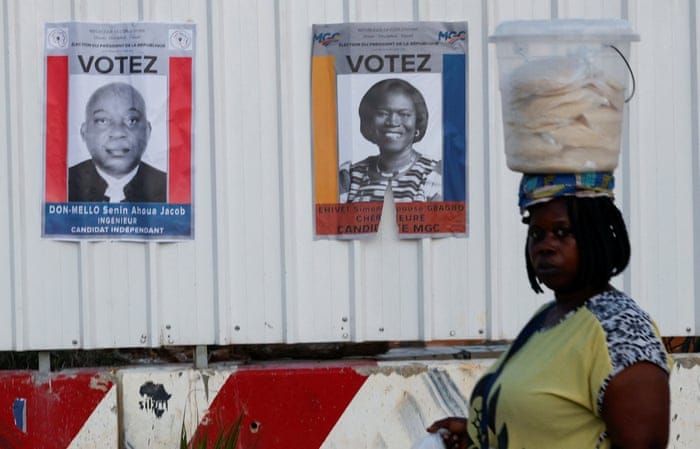Ivory Coast heads to the polls this Saturday in a closely watched presidential election that pits an 83-year-old incumbent, a former first lady, and a business tycoon against one another, as questions mount over the future of democracy in the world’s top cocoa producer.
President Alassane Dramane Ouattara, known simply as “Ado” to his supporters, seeks a fourth term in office, citing the constitution’s allowance for his candidacy. Critics, however, view his continued rule as a setback for democratic transition, arguing that his long leadership risks deepening political fatigue.
Among those challenging Ouattara are Simone Gbagbo, the former first lady and ex-wife of ousted President Laurent Gbagbo; Jean-Louis Billon, a wealthy businessman and former minister known for his populist energy; and Henriette Lagou Adjoua, a women’s rights advocate and former government minister. Former ally Ahoua Don Mello also joins the race, though analysts see him as a lesser contender.
The campaign has been lively, marked by rallies filled with dancing, music, and sharp political rhetoric. Yet beneath the celebration lies widespread unease over potential unrest. Many Ivorians still recall the 2010 post-election conflict, which killed more than 3,000 people after a disputed vote between Ouattara and Gbagbo.
Billon, representing the Democratic Congress (CODE), has drawn large crowds in cities such as Yamoussoukro. Promising “economic fairness and generational change,” he argues that the country’s rapid growth has left many citizens behind.
“The economy is growing, but not for us,” Billon declared at a recent rally.
Simone Gbagbo, now leading the Movement of Capable Generations (MGC), has re-emerged as a charismatic force. Dubbed the “Iron Lady”, she campaigns on education and youth empowerment, accusing the government of neglecting schools and social programs.
Ouattara’s camp points to his record of infrastructure projects and investor confidence as evidence of stability. His Rally of Houphouëtists for Democracy and Peace (RHDP) party continues to enjoy strong support in the north, where his Dioula-speaking base remains loyal.
Still, tension has flared. Over 700 opposition protesters were arrested earlier this month, and dozens were sentenced for participating in unauthorized marches. Security forces have since increased their presence in Abidjan and other major cities.
Analysts say the opposition’s fragmentation may ultimately benefit Ouattara, as key figures such as Tidjane Thiam and Laurent Gbagbo were disqualified from running and have not endorsed any other candidate.
Regional dynamics have also entered the debate. Ivory Coast’s firm stance against the military regimes in Mali, Niger, and Burkina Faso—and its alignment with Western partners—has sparked criticism from rivals who call for a more balanced foreign policy.
As voting day approaches, many citizens are preparing for uncertainty.
“We’re leaving Abidjan before the vote,” said resident Ahoua Diomande. “Every election brings fighting.”
Others remain hopeful.
“Ivorians don’t want to die again for politicians,” said Charm Matuba, an Abidjan resident. “I believe this time, peace will win.”



